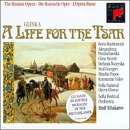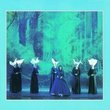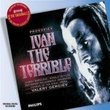| All Artists: Mikhail Glinka, Emil Tchakarov, Sofia Festival Orchestra, Boris Martinovich, Alexandrina Pendachanska, Chris Merritt, Sofia National Opera Chorus, Stefania Toczyska, Stoil Georgiev, Mincho Popov Title: Glinka: A Life for the Tsar Members Wishing: 0 Total Copies: 0 Label: Sony Original Release Date: 1/1/1991 Re-Release Date: 5/31/1991 Genre: Classical Style: Opera & Classical Vocal Number of Discs: 3 SwapaCD Credits: 3 UPC: 074644648720 |
Search - Mikhail Glinka, Emil Tchakarov, Sofia Festival Orchestra :: Glinka: A Life for the Tsar
 | Mikhail Glinka, Emil Tchakarov, Sofia Festival Orchestra Glinka: A Life for the Tsar Genre: Classical
|
Larger Image |
CD DetailsSimilar CDs |
CD ReviewsThe best and the complete version of a historical work. David A. Hollingsworth | Washington, DC USA | 12/01/1999 (5 out of 5 stars) "Mikhail Ivanovich Glinka (1804-1857) is considered to be the father of Russian classical music. Glinka essentially was the first Russian musician with a formal musical training (at the Boarding School for the Nobility in St. Petersburg and later in 1833-1834 with Siegfried Dehn in Berlin for composition). Before Anton Rubinstein founded the St. Petersburg Conservatory of Music in 1862 (with his brother, Nikolai Rubinstein the founder of the Moscow Conservatory by 1866), there were no formal professional institutions of music of any kind. Glinka was born into a wealthy family and was exposed to music of the West.Glinka's extensive travel abroad (to Italy and then to Berlin) gave him additional exposures, this time to the operas of Rossini, Bellini, Donezetti, others. After he returned to Russia from composition lessons under Dehn by 1834, Glinka understood music and especially operas enough so as to embark on his first opera, "A Life for the Tsar.""A Life for the Tsar", also the first Russian opera, was completed by 1836. The original title was "Ivan Susanin" but was changed to "A Life for the Tsar" by Glinka in dedicating the operas to Tsar Nicholas I after his visit to the rehersals. The orignal title was restored by 1918 by the Soviet Regime. The highly successful premiere of the work on November 27th, 1836 ensured the opera the permanent place in the repetoire in virtually every theatrical stages in Russia. Incidentially, "A Life for the Tsar" was performed (and recorded) more often than Glinka's second opera "Russlan and Ludmilla."Above all the recordings made on this work, Tchakarov, the Sofia National Opera Chorus, the Sofia Festival Orchestra, and the star singers gave a highly memorable and a polished performance. Not only did they performed the complete version of the work, there's this intimacy and warmths embetted. Boris Martinovich (as Ivan Susanin) was very commanding in his portrayal as a peasant of the Domnino village who love Russia and its Tsar enough the sacrifice his life. Alexandrina Pendachanska as Antonida (Susanin's daughter) was also magnificent and vivid while the rest of the cast never ceased to amaze me. Emil Tchakarov was on his way in possibly recording all of Russian operas. Sadly he succumbed to the AIDS endemic by 1991 at the age of 41. Sony Classical is doing him great justice in keeping his recordings undeleted. This recording is a gemstone, especially since recordings of Russian operas continue to take the back seat (either because original recordings of Russian operas never made it to the record shops or were deleted too prematurely or because new productions of this operas in theaters outside Russia are deemed as too risky by today's opera companies). This wonderful recording, however, is a reminder of just how much we are missing.Recommended, with grace." Listening, Then Purchasing W. Burton | NY & LA USA | 11/01/2008 (5 out of 5 stars) "This rendering by Tchakarov seems ideal for the untrained ear such as mine - untrained, that is as far as this opera goes. However, I do know Glinka's work, especially his symphonies and ballets. Sorry to disappoint so many critics here who seem to believe the old cut-up version with the bad sound is best. They might be spot on, but one has to become familiar with the opera first and hear the beauty of the work without distraction, before one can become an aficionado. And, this Tchakarov version is beautiful. The sound too is making me want to own the opera.
The voices are stunning, Pendachanska, Martinovich and Chris Merritt, (the only soloist I know of the group). Glinka's music and verse is compelling - a mixture of the wonderful sweep of mazurka and waltz - the Russian of the early-mid 19th century mixed with a nice shot of Bel Canto of the same era. I am most impressed and will indeed buy this recording as soon as I finish this review. For all you Glinkaphiles out there, I assure you, I'll enjoy this work enough to probably become just like you and start looking for the better (more authentic?) versions, but I'm going to absorb the hell out of this lush work for a while first. I don't ever think I'll get to the point where I'll knock Merritt's brightly brilliant voice because of his accent, as I find accents charming and the speaker/singer most admirable for trying to communicate in a language not his own. However, finding the fabulous bass who was spoken of as brilliant in the other recording might be something I'll do. The opera is nearing it's end now and it's been a truly beautiful experience. Can't wait to get started with my own copy. " |

 Track Listings (10) - Disc #1
Track Listings (10) - Disc #1



